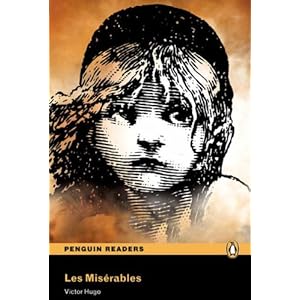 In order to continue the trend of reading books with new adaptations out this month, I tackled Les Misérables by Victor Hugo. It is a big giant heavy book. The first thing I needed to decide was which translation to read. There are quite a few out there and they seem to be of varying quality. I had ordered a new translation that was supposed to come out this year from Amazon, but what they sent was actually a different translation from the 1970's by Norman Denny. It seems the publisher switched which translation was going to be the one they were pushing as the movie tie in... Anyway, after a bit of research it seems that this translation is supposed to be one of the better ones so I decided to just go with it.
In order to continue the trend of reading books with new adaptations out this month, I tackled Les Misérables by Victor Hugo. It is a big giant heavy book. The first thing I needed to decide was which translation to read. There are quite a few out there and they seem to be of varying quality. I had ordered a new translation that was supposed to come out this year from Amazon, but what they sent was actually a different translation from the 1970's by Norman Denny. It seems the publisher switched which translation was going to be the one they were pushing as the movie tie in... Anyway, after a bit of research it seems that this translation is supposed to be one of the better ones so I decided to just go with it. Last year Lucinda and I saw the musical, so I had some knowledge of the basic story but really couldn't remember too many specifics except that there was a sewer chase at the very end. The version I read is 1232 pages, so it is a bit difficult to quickly summarize the story completely... but essentially the story is of Jean Valjean and the way he redeems himself and sacrifices everything he has in the process. At the beginning he has left prison after 19 years for first stealing a loaf of bread and then for continually trying to escape. He steals some silver items from the Bishop of Digne that first night and is quickly caught. When the police bring him back to the Bishop, the Bishop says that he gave them to Jean so that he could have the money in order to start his life over again. Jean realizes that he has one last chance and uses the funds from the stolen items to start a new identity and begins a business that makes him incredibly wealthy. With this wealth he goes around helping all the poor people of his town. Then he meets Fantine. She's had a very hard life. She's just been fired from Jean's factory, has no money, and has left her small child Cosette in the care of the Thénardiers, a couple that run an inn. Jean promises to bring Cosette back to Fantine but gets sidetracked when he finds out that another man is being convicted as being "Jean Valjean" for breaking his parole. Jean turns himself in but first asks the policeman Javert if he can go retrieve Cosette before being taken away. Being completely unmoved by anything, Javert says no... (this is where Fantine would sing I Dreamed a Dream and everyone crys while watching the musical)... Fantine dies and Jean goes back to jail.... but of course Jean Valjean escapes again and goes to find Cosette. The Thénardiers are completely evil people and make Cosette's life miserable. Jean pays them off and takes her away to Paris where they luck into living in a convent.... cue the intermission... Now it is ten years later, Cosette has grown up... she meets a boy, Marius.. there's a revolution in the streets .... and the book adds a million new characters at this point... but basically Jean Valjean doesn't want to give up Cosette who is like a daughter to him, but eventually he saves Marius' life and helps Cosette have everything she would ever want.
From pretty much start to finish, I really enjoyed this book. It took a long time to get through, but it was worth the effort. The novel certainly takes its time in telling the main story and pretty frequently Hugo goes off on long stories about minor characters or entire sections on his thoughts about a topic or background history of something. The first sixty pages or so are just about the Bishop of Digne and why he has the silver that Jean Valjean later steals. Then there is about a fifty page retelling of the battle of Waterloo... which has almost nothing to do with story except for one small detail that is of some minor importance at the end. After Jean Valjean escapes into the sewers, there is a fifteen page chapter about this history of the sewers in Paris. There are also entire chapters about Hugo's opinions on convents and this history of criminal slang. That's why the book is so massive. However, I found all of these details really fascinating and thought they gave the story much more depth... unlike the details and background in Anna Karenina which kept putting me to sleep. I was also glad to see that the character of Gavroche plays an integral part of the storyline in the book and has some of his own adventures, where as in the musical he is just kind of there and doesn't have the fullest back story.
The book is easily in my top 50. I'll give it the rare A+.
No comments:
Post a Comment